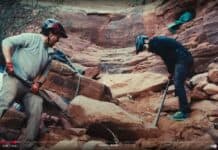While music programs are being eliminated nationwide due to budget cuts, and focus on No Child Left Behind Act basics, music is vital for both students and communities, according to Evan Fein, a Juilliard doctoral student currently in Sedona.
Fein was among the musicians and music aficionados who collected musical instruments Friday, Nov. 19, for Sedona Red High School’s burgeoning music program.
Students who sing, take violin lessons or learn to play guitar are more likely to graduate high school, go to college and earn more money in their lifetime, according to A Harris Poll conducted in 2007.
“We know for a fact that when kids have access to the arts or music, they excel in every academic field. There is lower drug use, less violence and better academics,” he said.
The Harris Poll found 65 percent of high school graduates studied music compared to 86 percent of college graduates. Almost 90 percent of Americans with master’s degrees or doctoral degrees at one time learned to read a musical score, sing a tune in chorus or just strum chords on a Gibson.
In 1975, the state government of Venezuela founded El Sistema, a national music program. In 2007, the program had a budget of $29 million, funded the efforts of 250,000 students in orchestras and brought the 200-instrument Simón Bolívar Youth Orchestra to perform at Carnegie Hall, in New York City.
“In Venezuela, crime rates have dropped and academics have increased,” Fein said. “Now there are more kids in organized music than organized sports.”
Fein can attest to the importance of music firsthand. He is in his last year of his doctoral program at the Juilliard School, one of the most prestigious music schools in the world. Located at Lincoln Center in Manhattan, N.Y., the school is known for its classical music, jazz, dance and drama programs.
 Alumni include actors Val Kilmer and Kevin Spacey, cellist Yo-Yo Ma, composer Marvin Hamlish, pianist Emanuel Ax and Alan Greenspan, who was a saxophonist and clarinetist long before he became chairman of the Federal Reserve Board.
Alumni include actors Val Kilmer and Kevin Spacey, cellist Yo-Yo Ma, composer Marvin Hamlish, pianist Emanuel Ax and Alan Greenspan, who was a saxophonist and clarinetist long before he became chairman of the Federal Reserve Board.
As Fein finishes up his eighth year of musical training, he teaches ear training and music theory, performs and works as a freelance composer.
He is often hired to write music for chamber orchestras and ensembles. He is also composing his first opera to be performed at Juilliard in the spring. The five-voice chamber opera is melodic and accessible, but with a classical style that draws on collective musical experiences that people have today, he said.
Fein was recently hired to orchestrate the music for “Sedona: The Movie,” a feature film in postproduction debuting at the Sedona International Film Festival in February.
While he often has six months to produce his commissioned compositions, he has only six days to orchestrate the film’s score. The score’s vocals and guitars were written and performed by another musician, and Fein will take her music and adapt it into a full musical score.
“Hollywood moves faster than the classical music business. It’s very schizophrenic, but exciting and very rewarding,” Fein said. “There’s no such thing as a regular paycheck for a composer, but that’s what makes it exciting.”
Fein did not grow up as a cloistered musical prodigy before Juilliard. He was born to a nonmusical but supportive family and raised in a Cleveland suburb.
His high school was roughly the same size as SRRHS, Fein said. It had a concert band, several choirs and was a social and cultural hub of the community.
“Because we were so small, we didn’t have those traditional cliques,” he said. “We knew we couldn’t have wresting practice at the same time as choir practice because we’d lose the tenor and bass sections.”
“During football games, there were times when the guys, the football players, would run off, put on their band uniform and play the halftime show,” he said.
After Fein graduated in 2003, an economic crunch hit the state of Ohio. There was less money available, teachers got cut and classes got bigger. The school district couldn’t pass a school levy to keep programs alive and the teachers went on strike, he said.
When a smaller levy did pass, it was only for the basic operation of the school. Every division faced cuts.
The industrial technology, computer technology and instrumental music departments completely disappeared.
“The shame of it was our bands and choirs had won national awards,” Fein said.
“Of course, when I heard there were similar problems in Sedona, I was all too eager to help,” Fein said.
Fein has been working to secure instrument donations with Mark Gorchesky, Ph.D., director of Mentoring that Matters, a multidisciplinary mentoring program working with SRRHS students.
Fein, Gorchesky and others collected instruments and held a play-in with several musicians and bands. Fein himself played piano with bassist Alex Gorchesky and jazz guitarist Ward Johnson, SRRHS music director and a graduate of the Berklee College of Music in Boston.
“We invited people to bring in old instruments and just enjoy the concert,” Fein said.
“I’m blown away by the level of talent I saw in Sedona today. For a community of this size, I was really surprised,” he said.
Fein also got a look at the new Sedona Red Rock Performing Arts Center.
“I was extremely impressed with the quality of the new facilities. It would be a shame not to have a performing ensemble to put in it,” he said.
This first collection of musical instruments received an “overwhelming response,” Mark Gorchesky said.
Sedona residents donated scores of instruments, among them, a vibraphone, xylophone, tubular bells, two violins, two trombones, two trumpets, a flugelhorn, six studio-quality guitars, two clarinets, two upright keyboards with setups, three amps, wireless microphones and a 1930s-era antique drum set with original cowhide drum heads.
The biggest donation of the day was a $2,000 donation by a former trumpet player who wishes to remain anonymous.
To donate instruments or contribute to the music program at the school, contact Gorchesky and Mentoring that Matters, Sedona Red Rock High School or the Sedona Performers Guild.


















